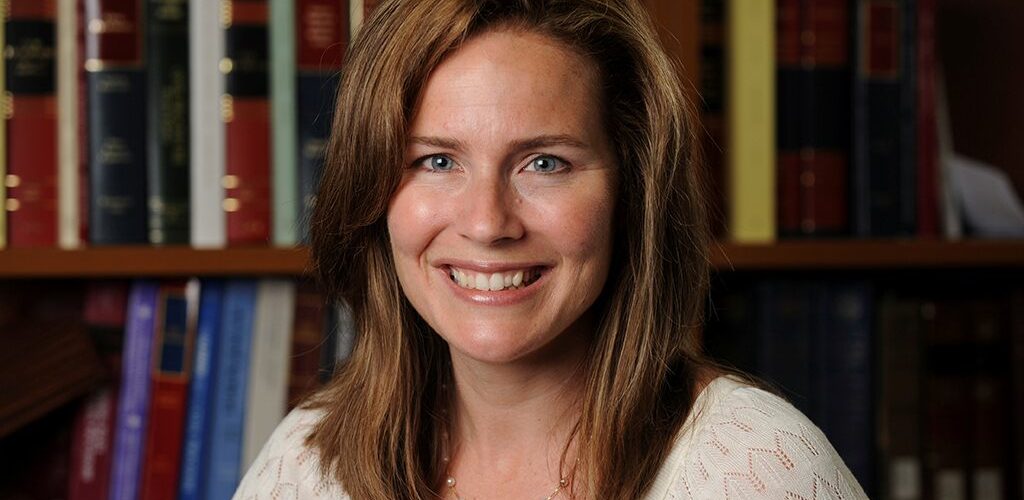Judge Amy Coney Barrett, who President Trump nominated Saturday to serve on the Supreme Court, could have a major impact for decades to come on landmark civil liberties cases and other cases coming before the high court if the Republican-controlled Senate confirms her as expected.
Barrett could have a long tenure on the court because she is only 48, which is young by Supreme Court standards. She would fill the seat held for the past 27 years by Justice Ruth Bader Ginsburg, who died Sept. 18 at age 87.
The liberal Ginsburg was considered by many to be the only justice on the Supreme Court with a civil rights background. She played an oversized role in many key civil rights decisions.
Barrett has served for nearly three years as a judge on the 7th U.S. Circuit of Appeals, and spent nearly two decades as a law professor at her alma mater, Notre Dame Law School.
So how would a Justice Barrett’s impact be felt in civil liberties and civil rights cases at the Supreme Court?
Despite the incessant media attention focused on Barrett’s Catholic faith and her sincerely held beliefs on the dignity of human life, her tenure at the Supreme Court would be marked by far more issues than abortion.
More from Opinion
The court faces several critical civil liberties issues in the coming term and beyond. These issues include the constitutionality of remaining aspects of ObamaCare; judicial review of coronavirus restrictions that infringe on civil rights; qualified immunity; the meaning of gender under federal laws; the First Amendment protection afforded to government speech; and free speech “zones” on college campuses.
Here is a brief look at some of the issues Barrett would face as a Supreme Court justice:
ObamaCare
Barrett could be the swing vote on the constitutionality of the Affordable Care Act, more commonly known as ObamaCare. In her now-famous 2017 law review article, Barrett wrote: “In NFIB v. Sebelius … Chief Justice Roberts pushed the Affordable Care Act beyond its plausible meaning to save the statute.”
The Supreme Court upheld ObamaCare’s individual mandate on a 5-4 vote, with Ginsburg joining the majority. That decision, when revisited, is poised for a different outcome if a Justice Barrett hews to her writings on the issue.
Coronavirus litigation
Chief Justice John Roberts and countless U.S. district court judges across the country have relied on the 1905 mandatory vaccination decision Jacobson v. Massachusetts to allow virtually unlimited power to be exercised by state and local governments during the COVID-19 pandemic.
The Supreme Court has refused to even review many examples of gross government overreach in the name of “emergency powers.” (Jacobson’s dark history includes justifying forced sterilization of mentally challenged adults, something that is now viewed as barbaric and unconstitutional).
One vote prevented the Supreme Court from granting South Bay Pentecostal Church a temporary injunction that would have given it relief from the California Democratic Gov. Gavin Newsom’s expansive shelter-in-place order.
Ginsburg — voting with Chief Justice John Roberts and Justices Stephen Breyer, Sonia Sotomayor and Elena Kagan — rejected the church’s petition. Justices Clarence Thomas, Samuel Alito, Neil Gorsuch and Brett Kavanaugh voted to grant South Bay Pentecostal Church an injunction.
It is highly likely that the Supreme Court will get another opportunity to rule on the issue and decide the bounds of Jacobson v. Massachusetts. The South Bay case itself could make its way back to the Supreme Court soon. A Justice Barrett could be the swing vote on this issue when it returns to court.
Earlier this month, Barrett’s three-judge appeals court panel ruled against the Illinois Republican Party’s challenge to Democratic Gov. J.B. Pritzker’s executive orders responding to the coronavirus pandemic. However, this decision is unique: the Republican Party challenged the accommodation afforded to houses of worship, assuming that if its challenge were successful the party would also benefit from larger gatherings.
While the ruling upheld Pritzker’s orders, it did so on narrow grounds that upheld a religion carve-out from COVID-19 restrictions, rather than imposing more or the same burdens on faith gatherings than on other types of gatherings.
If confirmed, Justice Barrett could be the swing vote that would tip the court’s position on First Amendment COVID-19 challenges such as South Bay.
Qualified Immunity
Last June the Supreme Court rejected several challenges to qualified immunity — the judicially fabricated doctrine that grants government employees immunity from being sued civilly when performing discretionary actions.
In application, qualified immunity prevents professors and administrators at public colleges and universities from being held civilly responsible for violating students’ First Amendment rights. It also prevents police officers who use excessive force from being held accountable civilly. Simply put, it blocks the courthouse doors to many claims of government oppression.
In a 2018 dissent authored by Justice Sotomayor, Justice Ginsburg joined to express her concern that courts are treating qualified immunity as an “absolute shield.”
Also, this past June, Justice Thomas criticized the qualified immunity doctrine when the Supreme Court declined to hear the case of Baxter v. Bracey. At the 7th Circuit, Judge Barrett wrote at least one opinion rejecting a police officer’s claim of qualified immunity for a wrongful arrest, an encouraging sign that she will not reflexively shield government wrongdoing.
This is an issue of great interest to both the right and the left — quite simply, when the government errs, who should pay the price? In the wake of national unrest over perceived police brutality against African Americans, this issue takes on even greater cultural significance.
Title VII of the Civil Rights Act of 1964
The Supreme Court’s recent ruling in Bostock v. Clayton County will no doubt give rise to gender jurisprudence cases. In Bostock, the high court ruled in a Justice Gorsuch opinion that the protection from discrimination on the basis of “sex” in Title VII of the Civil Rights Act of 1964 also prohibits discrimination on the basis of sexual orientation and transgender status.
Now that the Supreme Court has disconnected “sex” from biology, how will the court respond to future cases challenging boys’ and girls’ athletics, sex-segregated shared facilities, or health care providers who for religious reasons refuse to provide gender reassignment surgeries? Justice Barrett could well affect the direction of this evolving jurisprudence.
CLICK HERE TO SIGN UP FOR OUR OPINION NEWSLETTER
Government Speech
The friction between government speech and the creation of public forums for expression will likely make its way through the courts again soon. Over the past several months, numerous murals with the words “Black Lives Matter” have been painted in the middle of public roads — either without permits, or with viewpoint-selective permission.
In some cases public officials have allowed these murals to remain, adopting them as government speech while rejecting permit applications to paint similar murals expressing a variety of other viewpoints.
As Justice Alito warned in Pleasant Grove, Utah v. Summum, there is a “legitimate concern that the government speech doctrine not be used as a subterfuge for favoring certain private speakers over others based on viewpoint.” Barrett’s views on this issue are unknown, but likely to come into play in coming years.
Free Speech on Campus
The Supreme Court recently agreed to review the case of Uzuegbunam v. Preczewski, challenging Georgia Gwinnett College’s censorship of a student to bar him from sharing his Christian faith outside of the school’s tiny free speech zone.
CLICK HERE TO GET THE FOX NEWS APP
The case has not yet been set for oral argument, so it is very possible that if the Senate confirms Barrett to the Supreme Court quickly, as appears likely, she will almost immediately have the opportunity to rule on the case. This could have broader First Amendment implications for such zones.
If confirmed to the Supreme Court, Amy Coney Barrett could immediately affect many legal and cultural debates in our country. As a nation of laws, and one that has recognized greater rights of its citizens than any other state in human history, this pivotal appointment will impact our civil rights jurisprudence long into the future.


















